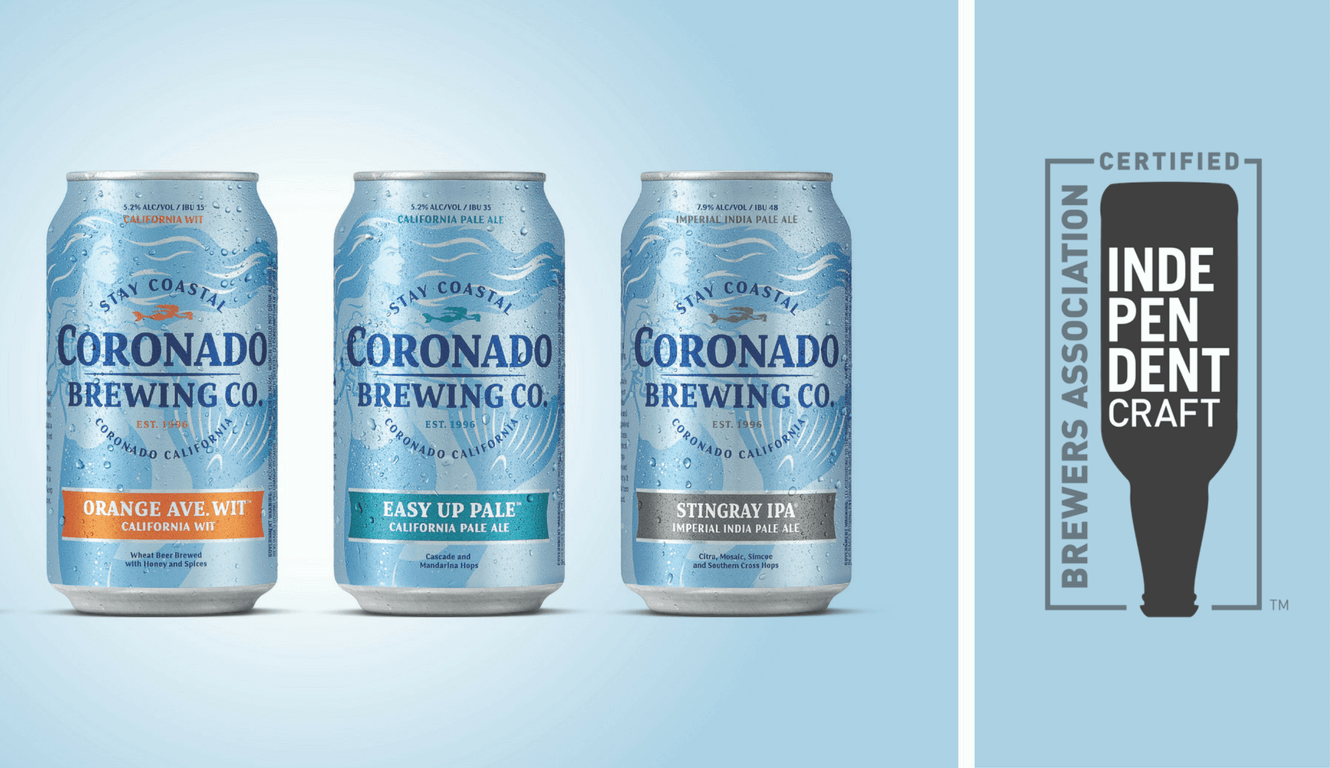Craft Chaos: What the independent craft brewer seal means for breweries of all sizes.
The independent craft brewer seal, recently unveiled by the Brewers Association, is causing a stir in the beer community. Some breweries are rejoicing, while others see it as an unnecessary step to divide an already contentious category. We’re not here to pick a side; in fact, we work with breweries all across the spectrum. While the seal may seem like a one-sided win for small, independent breweries, it brings obstacles and opportunities for brands of all sizes.
We’ll get into the design challenges later because today it’s all about your brand. How can independent and non-independent breweries succeed in today’s evolving craft landscape? We’ve got a few suggestions.
Independent breweries have to avoid the traps.
Don’t use independence as a crutch.
For 20+ years craft breweries across the country have worked hard to make the word craft meaningful, and it’s worked. Today, the word represents company size, location, ownership, and a commitment to innovation and quality. The independent craft brewer seal is much more than a logo or a marketing tactic – it’s an effort to redefine craft as large corporations are acquiring small craft breweries.
Independent will quickly become a symbol of size and ownership, but it will take time for it to be synonymous with the most important trait – quality. This is because non-independent breweries like Ballast Point, Elysian, and Lagunitas are still innovating and producing extremely high-quality beer. For independence to matter, it needs to represent better quality, and that won’t happen overnight.
Consumers need to understand why independence matters. How does it make your beer or your brand better? Independence is a point of validation, not your whole story. Does independence help you innovate more nimbly, use fresher ingredients, attract better talent, or deliver better flavor? If so, don’t assume consumers will understand that. Unless you make the case for why your independence matters, the seal won’t solve any problems.
Being different is more important than being independent.
The US market can support a large number of craft breweries, but only a few can rise to the top. The new seal distinguishes 5200+ independent breweries from around 70 other beers on the shelf. Simply put: it’s a small win in a much larger battle.
Most independent breweries should focus on differentiating themselves from the Davids, not the Goliaths. Even with the seal, you’re still competing with an unprecedented number of independent brands. We aren’t suggesting that you avoid using the seal; instead, we think that there is a much larger opportunity to differentiate your brand. If your differentiator today is simply being indie, then you’re probably selling yourself short.
So how do you differentiate your brewery in today’s market?
We help brands of all sizes find their unique position in the market. The process starts with asking tough questions. What do you stand for? What makes you different? What is your value locally? Can your brand scale to new markets? Who is in your tribe? Then it’s time to define your story and bring it to life through packaging, imagery, events and social media. It’s hard to simplify your message without understanding what you stand for. Once you do, your brand can carve out its own unique space.
Non-independent breweries can create their own opportunity.
Be authentic, now more than ever.
Many of the brands that have been acquired were pivotal players in the craft beer revolution and are still beloved by drinkers across the country. Other brands have cultivated valuable fan bases through smart branding and consistently great beer. Both groups can overcome a lack of independence by avoiding defensive behavior in favor of recommitting to their mission and values.
If you were acquired, it’s because you still have untapped potential. The seal shouldn’t change that. See this as an opportunity to emphasize what you stand for. Stay true to your voice and your mission. Hire people who embody your brand. And don’t be afraid to let consumers peek behind the curtain. As long as your beer is still great and your brand is still authentic, then you don’t need a seal of approval, and you don’t need to defend yourself.
Celebrate your advantages.
Some things we’ve seen from our partners and friends who have been acquired are massive improvements in quality control and access to previously unattainable machinery, ingredients, and equipment (like barrels). Although some people may never believe it, acquisition can actually make your product better. Maybe without financial backing it would have been impossible to get those rare Madeira Port Barrels for your aging program. Maybe now you can bring craft beer to places where it couldn’t go before. Maybe your brand can help small upstart breweries find their footing.
Find out how your unique situation gives you an advantage and promote it. Don’t just make the Madeira Barrel-Aged Beer – document the process. Don’t just improve your quality control, talk about it and celebrate it. Let consumers know that your acquisition can actually benefit them. Losing your status as independent doesn’t have to put you on the defense. Take your strengths and elevate them. Amplify them. If you do, missing out on the independent craft brewer seal won’t matter quite as much.
